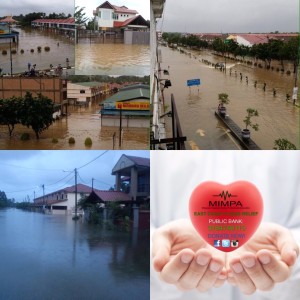 The flood disaster this year have caused devastating effects to all affected Malaysians. Keeping healthy is a huge challenge but we can achieve it by observing some guidelines on general safety and food hygiene. Flood affected residents are vulnerable from a myriad of hazard such as water and electrical hazard. Water & vector-borne diseases such as typhoid fever, cholera, leptospirosis, dengue and dengue haemorrhagic fever are rampant during flood season.
The flood disaster this year have caused devastating effects to all affected Malaysians. Keeping healthy is a huge challenge but we can achieve it by observing some guidelines on general safety and food hygiene. Flood affected residents are vulnerable from a myriad of hazard such as water and electrical hazard. Water & vector-borne diseases such as typhoid fever, cholera, leptospirosis, dengue and dengue haemorrhagic fever are rampant during flood season.
We can prevent it by following these tips
- Prevent drowning accidents
Keep children away from flooded areas. It doesn’t take long and it doesn’t take much water for young children to drown. In many cases, children who drowned had been out of sight less than five minutes and were in the care of one or both parents at the time.
- Do not let children (or even adults) play with contaminated flood water as it may carry bacteria as well as there are risk of electrocution.
Flood water may contain sewage and dead animal carcasses which may carry diseases. Stay far away from downed power lines or anything that is touching it. If your home was flooded, look for signs that your appliances have gotten wet and best to throw them away to protect you from electrical shock or fire. Do not try to fix electrical appliances yourself.
- Keep yourself and your family hydrated with clean water
Avoid drinking flood contaminated water. If you don’t have bottled water, you should boil water to make it safe. Boiling water will kill most types of disease-causing organisms that may be present.
If the water is cloudy, filter it through clean cloths or allow it to settle, and draw off the clear water for boiling. Boil the water for one minute, let it cool, and store it in clean containers with covers.
– Be alert and keep your food safe during flood
Do not eat food that may have been contaminated with flood water. Discard any food that is not in a waterproof container if there is a possibility that it has been in contact with flood water. Check canned foods for any damages. Discard any food in damaged cans
- swelling, leakage, punctures, holes, fractures, extensive deep rusting, or crushing/denting.
Thoroughly wash food containers with soap and water, using hot water if available.
- For those with chronic illness and elderly with health concerns – make sure that you still continue taking your prescribed drugs. If your drugs have been in contact with flood water, throw them out especially if they are not sealed in their original packaging. Seek medical help early.
Also spare a thought to the relief workers and work with them – not against them. Listen to their direction and advice. If you have been advised to evacuate, please do so immediately and do not wait until the last moment to leave. Switch off all electrical appliance and your main switch before you leave home. Make sure gas stoves switched off and gas supply disconnected. Only take your important belongings like personal insurance, birth certificates, medications, cellphones etc. Bring useful stuff like flash light, spare battery, power banks etc. Inform family members elsewhere about your whereabouts and which evacuation center you are going to.
For those staying in relief centers – you can help by keeping your living area clean and not throwing rubbish around you. Remember to clean up after yourself. Help the relief workers by cooking and cleaning up after them. Watch over your kids and other residents’ children to make sure that they stay out of trouble. Inform relief workers if you noticed anyone around you who were ill and not feeling well. Be thoughtful of the plight and needs of vulnerable people like elderly, infants, pregnant, post partum as well as breastfeeding women.
Together – we can protect everybody’s health and keep everyone safe.
Dr Nurhidayati is a permanent columnist for The Malaysian Medical Gazette and an internal medicine physician.
[This article belongs to The Malaysian Medical Gazette. Any republication (online or offline) without written permission from The Malaysian Medical Gazette is prohibited.]
